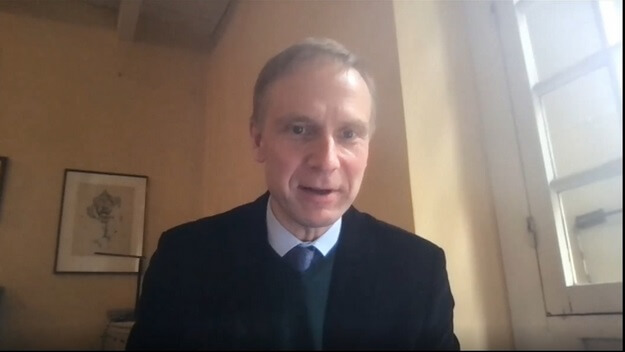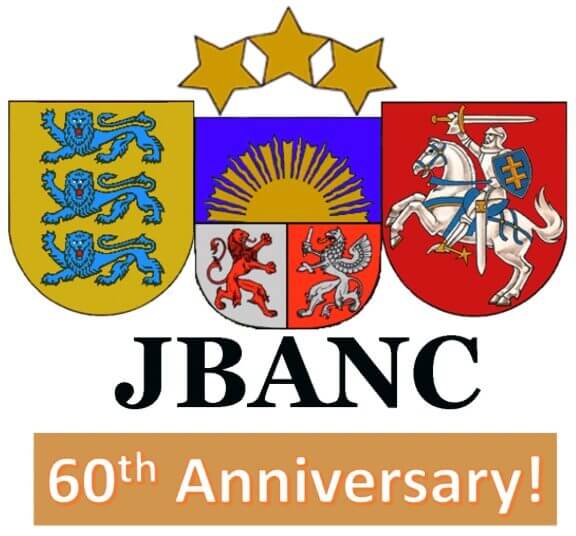The Joint Baltic American National Committee (JBANC), commemorated its 60th anniversary by organizing an online forum on April 28 to discuss “The U.S.-Baltic Relationship: Parliamentary Perspectives.” The discussion focused on transatlantic relationships, the upcoming NATO Summit, cooperation between the Baltic parliaments and the U.S. Congress, and JBANC’s work.
The event featured leading representatives of the foreign affairs committees of the parliaments of Estonia, Latvia, and Lithuania: Ojārs Kalniņš, Deputy Chairman of the Foreign Affairs Committee of the Latvian Parliament; Eerik-Niiles Kross, Member of Estonian Parliament; and Emanuelis Zingeris, Member of Lithuanian Parliament.

Žygimantas Pavilionis, Chairman of Foreign Affairs Committee of the Lithuanian Parliament was not able to participate due to a late-developing conflict but sent a video greeting. Pavilionis was, in fact, traveling at the same time to Ukraine with his counterparts, Marko Mihkelson and Rihards Kols, to shore up solidarity with Ukraine as they face increased military threats from Russia. Pavilionis thanked JBANC and Baltic-Americans for never forgetting the Baltic countries during the Soviet occupation and for helping in the fight for the restoration of independence of Estonia, Latvia, and Lithuania. Today, he said, it is important to keep fighting in support of Ukraine, Georgia, Moldova, and Belarus, and against Russian, Chinese, and Cuban oppression, and human rights violations against its citizens.
A former Ambassador to the United States, Ojārs Kalniņš, who is also the head of Latvia’s delegation to the NATO Parliamentary Assembly, has been active in the recent creation of that body’s Crimea Platform. The Platform was established “in order to increase the effectiveness of the international response to Russia’s ongoing occupation and ultimately achieve Crimea’s full peaceful return under Ukraine’s effective control,” as stated by the NATO PA’s website. U.S. Congressman Rick Larsen (D-Washington) is also an active member of that group. The new chairman of the NATO Parliamentary Assembly is Representative Gerald Connolly (D-Virginia). Both are members of the House Baltic Caucus in the U.S. Congress.
Kalniņš believed that it is important to keep up the same level of relationship between the Baltics and United States as we have had for the past 30 years, “regardless of who’s in Congress and who’s in the White House.” The Baltics, he said, have been “success stories, as members of NATO and the EU.” The number one priority right now,” reflected Kalniņš, “is to bring the United States and European Union back together and rebuild the relationship.” The biggest challenge and security threat right now, he stated, is Russia’s war against Ukraine, and the potential spillover effects.
Eerik-Niiles Kross agreed with Kalniņš that “we need more of the same” in the U.S.-Baltic relationship. The Baltics have been the “staunchest allies” of the U.S. in the EU and maybe even in wider Europe, and there is every intention, in his opinion, in continuing that. With that said, Kross still voiced his hopes for a “stronger cross-Atlantic relationship, U.S. influence and standing in the North Atlantic alliance, and continued support for the emerging democracies.” While Kross agreed that the Baltics are a success story, he paraphrased Ronald Reagan to remind the audience that “losing your freedom is just a generation away.” He said that it is in our interests and important that Ukraine, Belarus, Georgia, and Moldova eventually succeed and “do not drift away towards the Russian, Chinese, Eurasian sphere of influence.”
Commenting on relations between the Baltic parliaments and the U.S. Congress, Kalniņš recalled his last visit to Washington, DC in March 2020, when he, together with a delegation from the Latvian parliament, including Speaker Ināra Mūrniece, met with Speaker of the U.S. House of Representatives Nancy Pelosi (D-California). Congressional delegations between the U.S. and Baltics have been many (excepting during the Covid-19 era), especially after the start of Russia’s war against Ukraine seven years ago. During their trips, Members of the U.S. Congress often visit the NATO bases in the Baltics and meet U.S. troops who are there. Kalniņš said that it is also important to recognize Canada, which leads NATO’s multinational Enhanced Forward Presence (EFP) Battle Group in Latvia. These are akin to the EFP groups led in Estonia by the United Kingdom and in Lithuania by Germany. The U.S. is the core of the EFP group in Poland.
Emanuelis Zingeris, the head of Lithuania’s delegation to the Parliamentary Assembly of the Council of Europe, and a signatory of Lithuania’s Act of Independence in 1990, thanked the JBANC and Baltic-American community for helping to share and spread transatlantic values during the past decades. The solidarity and principles of democracy which we demonstrate, he remarked, must be used to protect ourselves from “active killers of democracy” like China, Russia, and Belarus.” JBANC, according to his example, is an “active supporter of democracy.” Zingeris pointed out that June 14 is the 80th anniversary of the first massive Soviet deportations in the Baltic countries. In the Baltic countries, commemorative events are being planned, and it should be an opportunity to work together to share messages of support and solidarity on that day.
June 14th is also the date of the next NATO Summit, which will be held in Brussels. Although major decisions will already be settled on prior to the Summit, one important step that needs to be taken, in the opinion of Eerik-Niiles Kross, is to secure a Membership Action Plan for Ukraine. The Putin regime in Russia does not have a veto over such matters, and certainly has not endeared itself to the Alliance with its continuing aggressive behavior. Not all NATO allies may agree, unfortunately. The “game of 2008” is being repeated, said Kross, referring to Russia’s invasion of Georgia in that year, which helped to curtail any chances of MAPs for Georgia and Ukraine at the time. NATO, “can’t afford” to back down like this in the long run. He expressed his satisfaction with the rotating U.S. troop visits to the Baltics, and naval presence in the Baltic Sea, but would still like to see a more “beefed-up” U.S. presence. Zingeris, in fact, called for permanent basing of a “serious number” of U.S. troops and naval vessels in the Baltics.
JBANC Managing Director Karl Altau moderated the forum, and Karin Shuey, the Estonian American National Council’s DC Director, managed the Zoom hosting and fielded questions from the audience. JBANC spring intern Emīlija Mendelsone assisted in the production.
The Baltic American Freedom Foundation (BAFF) helped to support the forum, the first of a series of at least three events this spring to commemorate JBANC’s 60th anniversary year. Please follow JBANC online to find out about further details of the upcoming events.
JBANC’s 60th Anniversary Forum can be viewed in its entirety on You Tube at: https://tinyurl.com/cf5vbjbs The Joint Baltic American National Committee, Inc. (JBANC) was established on April 27, 1961, at the Baltic Conference in Washington, DC. JBANC represents the American Latvian Association, Estonian American National Council, and Lithuanian American Council.
Karl Altau
JBANC Managing Director















